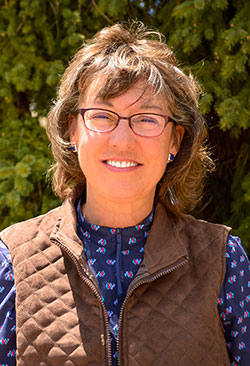
Contact Us
Institutional Communications
Bureau of Mines Building, Room 137
Laramie, WY 82071
Phone: (307) 766-2929
Email: cbaldwin@uwyo.edu
UW Researcher Receives Fulbright Award for Wildlife Research at U.S.-Canadian Border
Published May 04, 2020

Holly Ernest, a University of Wyoming professor of wildlife genomics and disease ecology,
has received a Fulbright Scholarship to conduct wildlife research at the Canadian-United
States border. (Holly Ernest Photo)
Holly Ernest, a University of Wyoming professor of wildlife genomics and disease ecology, has received a Fulbright Scholarship to conduct wildlife research at the Canadian-United States border.
Her project, titled “Linking Genomics, Bioinformatics and Disease Ecology for Wildlife Health at the Canada-USA Interface,” outlines an interdisciplinary project of transborder collaboration, research and advanced study based at the University of British Columbia in Vancouver, Canada.
“Part of the Fulbright program goal is for Fulbright Scholars to facilitate and build transborder collaborations for research, teaching and service, as well as the Fulbright goal of us serving as ambassadors from the United States to build positive international relations,” says Ernest, who also is the Wyoming Excellence Chair in Disease Ecology. “So, my Fulbright projects and overall sabbatical projects have multiple goals.”
Ernest, who already is approved for a one-year sabbatical from UW, says the Fulbright was to commence this fall. But, due to the COVID-19 pandemic, the Fulbright semester has been pushed back until January 2021. However, she adds that, if she is able to safely travel to the University of British Columbia this fall to start her sabbatical, she will do so.
For her Fulbright, Ernest will focus on three species of wildlife, applying genomics to their serious disease issues. Species include Rocky Mountain ungulates -- mainly elk and mule deer -- and chronic wasting disease as well as bighorn sheep and their pneumonia complex; sea otters along the Pacific Coast from California north into Canada and their serious diseases, which include fatal syndromes that involve toxoplasmosis, heart disease and thorny-headed worms; and studying migration, diseases and health of hummingbirds.
The project is designed to fulfill three main objectives, Ernest says.
-- Build collaborations with Canadian experts in bioinformatics, wildlife health and ecology to develop research in transborder movement of wildlife and transmission of pathogens of importance to wildlife, domestic animals, livestock and people.
-- Conduct computer-based bioinformatic research on host-pathogen data sets to evaluate relationships between host genomics and ecology of disease in wildlife species with ranges extending between the United States and Canada.
-- Advance her skills and capabilities in bioinformatics, and analysis and interpretation of complex genomic and ecological data.
“The expertise I gain will enhance my research, teaching and outreach, and I will convey this knowledge to my home institution and network of collaborators,” Ernest says. “This will be accomplished through a program of study with the unique and expertise-rich academic and professional community at the University of British Columbia and the Greater Vancouver region.”
Ernest says her initial inspiration for applying for a Fulbright was Sue VandeWoude, a professor at Colorado State University’s College of Veterinary Medicine and Biomedical Sciences. VandeWoude was awarded a Fulbright to travel to Tasmania to grow her collaborations and research on virus disease ecology and quantitative modeling to answer important questions to help wildlife conservation.
VandeWoude and Ernest collaborate on mountain lion genomics and viral disease ecology for populations in California and the Rocky Mountain West.
“This award is a big deal to me,” Ernest says. “It is a huge honor, and many people helped me to develop the plans and proposal for it. It definitely is a ‘village’ and transborder team effort.”
Ernest is one of over 800 U.S. citizens selected by the U.S. Department of State and the J. William Fulbright Foreign Scholarship Board to teach, conduct research and/or provide expertise abroad for the 2020-21 academic year through the Fulbright U.S. Scholar Program. Recipients of Fulbright awards are selected on the basis of academic and professional achievement, as well as record of service and demonstrated leadership in their respective fields.
The Fulbright Program is the U.S. government’s flagship international educational exchange program and is designed to build lasting connections between the people of the United States and the people of other countries. Participating governments and host institutions, corporations and foundations around the world provide direct and indirect support to the program, which operates in over 160 countries worldwide.
Since its establishment in 1946 under legislation introduced by the late U.S. Sen. J. William Fulbright, of Arkansas, the Fulbright Program has given more than 390,000 students, scholars, teachers, artists and professionals of all backgrounds and fields the opportunity to study, teach and conduct research; exchange ideas; and contribute to finding solutions to shared international concerns.
Ernest has been a member of UW’s faculty since 2015. She received her Ph.D. in ecology from the University of California-Davis; her Doctor of Veterinary Medicine and her master’s in veterinary physiology and pharmacology, both from Ohio State University; and her bachelor’s degree in biology from Cornell University.
Contact Us
Institutional Communications
Bureau of Mines Building, Room 137
Laramie, WY 82071
Phone: (307) 766-2929
Email: cbaldwin@uwyo.edu
